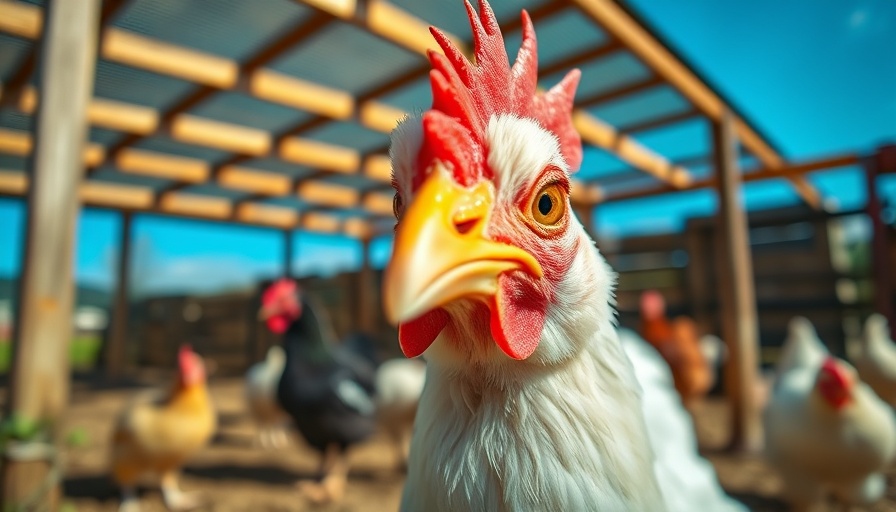
The Rise of Backyard Chicken Farming: A New Trend
In recent years, raising backyard chickens has surged in popularity across America, driven by a quest for fresh eggs, sustainable living, and a return to simpler times. Individuals from all walks of life are discovering the joys of keeping chickens, from urban apartment dwellers to families in the suburbs. As Tommy Shireman of Third Way Farm eloquently puts it, raising chickens is not just about food; it’s about reconnecting with nature and understanding the life cycle that nourishes us. This article dives deep into the essentials you need to know to start your own chicken-raising adventure.
Understanding the Costs of Raising Chickens
The prospect of enjoying fresh eggs undeniably attracts chicken enthusiasts, but the financial implications cannot be overlooked. One of the main aspects to consider before embarking on this journey is the cost. Initial investments include a coop, feed, and other related supplies, all of which can accumulate quickly. As Nathan LaPointe of Permaculture Gardens advises, while chicken math might not lead to profit, careful management can yield savings and sustenance.
For a clearer picture, many chicken keepers have shared their insights on costs. Jim Kurczodyna and his family have managed their flock’s monthly expenses to be around $4-5 per chicken. Given the laying patterns, the financial sense begins to emerge when weighing these costs against the price of store-bought eggs, which typically range from $5-$8 per dozen.
Projected Earnings and Financial Viability
Unlocking the economic advantages of raising chickens can be complex. On average, a laying hen can produce around six eggs a week, meaning a modest flock could yield significant savings on your grocery bill. Moreover, selling surplus eggs can generate additional income, offsetting some costs associated with their upkeep. However, the earnings may not be significant unless the size of your operation allows for selling larger quantities of eggs.
According to some chicken owners, the sale of eggs not only covers expenses but also reinforces community ties by providing fresh, organic produce to neighbors. The notion of 'chicken math' comes into play again, as hobbyists realize that the more chickens they raise, the lower their overhead per egg becomes. This perspective is echoed in various reports, illustrating that without the burden of commercial supply chains, home-raised chickens can flourish both physically and economically.
Addressing the Challenges: What to Expect
Of course, raising chickens does not come without its set of challenges. Local zoning laws may limit or regulate chicken-keeping, while neighbors might not always be enthusiastic about your new feathered friends. Predation and pest control also add layers of responsibility and cost to your chicken-keeping experience. Furthermore, most hens have a productive lifespan of about 2 years, requiring careful thought about what to do as chickens age and their egg production drops.
The potential downsides extend to the emotional dimension: it’s crucial for prospective chicken owners to understand the commitment involved. Many have gravitated toward chicken farming chasing a simplistic pastoral life only to find it requires considerable dedication. As the statistics suggest, shelters are reporting increasing numbers of abandoned chickens from those who underestimated the effort required.
Maximizing Your Chicken-Raising Experience
To ensure you reap the benefits of keeping chickens while minimizing costs, consider some actionable strategies. Buying supplies in bulk can alleviate feed expenses, while maintaining a clean coop environment prevents unnecessary health issues and treatment expenses. Moreover, utilizing kitchen scraps and allowing chickens to forage enhances their diet and markedly reduces feed expenses.
Engaging in local farming communities and joining chicken-keeping organizations can cultivate knowledge sharing and provide practical support. Lastly, nurturing relationships with your neighbors through the gift of fresh eggs not only adds value to your chicken-raising venture but also creates a stronger community bond.
Conclusion: Is Raising Chickens Right for You?
Whether you’re motivated by the financial benefits, the joy of raising lively pets, or a desire to forge a sustainable lifestyle, raising chickens can offer a fulfilling experience. While it doesn’t come without challenges, the rewarding outcomes of fresh eggs and the chance to teach responsibility (especially to kids) are compelling incentives. However, as with any commitment, thorough research and preparation are vital to ensuring your chicken project is as cost-effective and enjoyable as possible. For those ready to embrace this enriching endeavor, the world of backyard chickens awaits!
 Add Row
Add Row  Add
Add 



Write A Comment